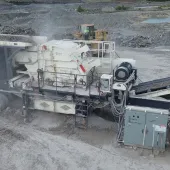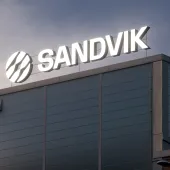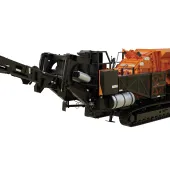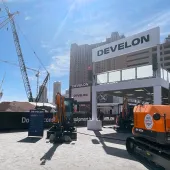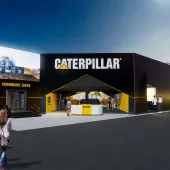Powerscreen help recycle historic Navy Annex complex in US

First published in the September 2013 issue of Quarry Management as Recycling Revamp
Powerscreen crushers play key role in the demolition and recycling of the historic Navy Annex in Virginia
Demolition Services Inc. (DSI) are using Powerscreen equipment to demolish and recycle the historic 1,000,000ft2. Navy Annex complex to provide for the expansion of the Arlington National Cemetery, in Virginia, the US.
The 42-acre site in Arlington, Virginia, in the US, consists of a parking area and seven buildings ranging from four to five stories high. The Navy Annex was built in 1941 as a temporary warehouse facility, but was converted to federal office use after Pearl Harbour. It served as the Marine Corps headquarters for more than five decades, as well as providing office space for numerous Navy personnel. It was also used extensively during the renovation of the nearby Pentagon prior to and shortly after the 9/11 attacks.
DSI, headquartered in Manassas, Virginia, specialize in demolition, abatement and hazardous materials projects. Founded in 2007, the company offers a total of 45 years of combined key personnel experience in structural, selective, marine and implosive demolition, as well as field management services, site excavation and renovation, and site development.
‘The Navy Annex is not the biggest or most involved project we’ve ever done,’ said DSI owner and president Ron Feather. ‘But it is indeed a massive job. We have complete responsibility for the total demolition of all the buildings, inside and out, and disposition of all materials. When the job is done, we’ll leave a flat empty site, ready for cemetery ground preparation.
‘Virtually, all annex materials, including crushed stone and metals, will be recycled. Practically nothing will go to landfill. A tracked Powerscreen XR400S primary jaw plant and a tracked Powerscreen XH320SR horizontal impact crusher are key components of the recycling operation. The crushers are producing 21A road base –also called RC6. We’ll use a little of it ourselves for various backfilling applications on other projects in the area, while the rest will be sold to contractors.’
‘We work our crushers hard,’ said DSI general supervisor Justin Stanley. ‘We run them to the absolute limits of everything Powerscreen claims they can do and sometimes beyond. This is tough, dependable, high-performance equipment. But the key to maximum performance of any equipment is the operators. We get maximum tons-per-hour because we’re putting quality equipment into the hands of expert operators.’
Mr Feather explained: ‘The equipment/operator factor is a big part of being able to bid for jobs competitively and still be profitable. Another major factor is downtime, especially unplanned downtime. Over the years I’ve had minimum downtime with Powerscreen equipment and practically no major unplanned downtime. That’s crucial, because unplanned downtime is often the difference between profit and loss.
‘Before I started DSI, I worked for other companies and had very good experiences with Powerscreen equipment. Based on that, I purchased a Powerscreen XH250 impactor plant for DSI several years ago, and we’ve had no issues with it whatsoever. It’s currently at work on our demolition project in Hampton, VA.’
DSI currently have 30 items of plant and equipment and 40 employees, including two full-time mechanics. The company’s equipment operating crews also perform routine maintenance procedures.
‘This is one of the areas where our Powerscreen equipment shines,’ continued Mr Feather. ‘The maintenance is simple – we strictly follow the manufacturer’s recommendations. Well-maintained equipment is dependable, high-production equipment with a long service life.’
Ron Feather also said that the distributor is often as important as the equipment. He has worked with Powerscreen Mid-Atlantic, Inc. for around 12 years and has found them to be knowledgeable and dependable, providing excellent service on a timely basis.
‘What it comes down to with a dealer is how good are they and what are they willing to do for you. Will they go the extra mile?’ he commented. ‘Powerscreen Mid-Atlantic certainly will. We’ve never had a lot of need for emergency service because we’ve not had problems of that type with our Powerscreen crushers. But Mid-Atlantic is always at the ready. We can get expert advice on crushers and crushing operations, especially from Ian Williamson, their sales manager, who has been a big help to us.’
On the Navy Annex project, DSI are using the XR400S jaw as the primary crusher feeding directly to the XH320SR impactor. ‘Some recyclers will use an impactor as the primary or even the only crusher, depending on the project and materials,’ said Mr Feather.
‘We’ve found on this job that using a primary jaw greatly increases our overall crushing efficiency and doubles the life of our impactor blow bars. We’re working with a lot of very large pieces of concrete rubble and much of it is loaded with steel. The jaw crusher breaks down the large rubble to –5in and frees up much of the steel before feeding the impact crusher, which, in turn, finishes the process by shattering the rubble to roadbase size and leaving the metals clean and ready for sale to metals recyclers.’
Mr Stanley added: ‘We found using medium chrome blow bars to be better for metals and rubble on this job than manganese or ceramic. One of the really great things about the Powerscreen XH320SR impactor is that it is actually a self-contained combination of crusher, screener, return conveyor and stacker. The return conveyor sends oversize material back to the crusher inlet, which helps minimize the number of machines we need for our crushing operation.
According to Mr Feather, a prime feature of the XR400S jaw plant is the hydraulic release, which provides overload protection. It prevents damage to the crusher by uncrushable objects such as metal and unduly large rubble.
‘The crusher simply pops open, we remove the obstruction, and we get on with production instead of shutting down for crusher repairs,’ he explained. ‘Some of the other features of the Powerscreen crushers that I value are dust control, safety shutdowns, and Scania engines for prompt response, high-performance and fuel-economy.’
DSI have also been impressed with the Powerscreen products’ fast set-up times. Mr Feather commented: ‘For example, the XH320SR impactor came to our Navy Annex site directly from a ship in Baltimore harbour and was set up and running half an hour after it arrived.’
The Powerscreen XR400S primary jaw plant is designed for medium-sized operations in the quarrying, demolition, recycling and mining sectors. Basic features include: processing up to 440 tons/h; a hydraulically folding feed hopper with boltless fixing system; hydraulic tilting conveyor system; efficient direct drive; high-swing jaw; height-adjustable product conveyor; and hydraulically folding extended hopper.
The Powerscreen XH320SR is a mid-sized horizontal impact crusher designed for superior reduction and high consistency of product shape for recycling, demolition and quarry applications.
Standard features include: efficient direct drive, processing up to 350 tons/h; a bolt-in cartridge grizzly with 42mm nominal spacing; load-management system to control feeder speed; hydraulic overload protection and adjustment; a four-bar rotor with twin apron design; PLC control of crusher speed; independent under-crusher vibrating pan feeder; and double-deck 11ft x 5ft post screen. Numerous options are available on both Powerscreen models.
For further information visit: www.powerscreen.com
- Subscribe to Quarry Management, the monthly journal for the mineral products industry, to read articles before they appear on Agg-Net



